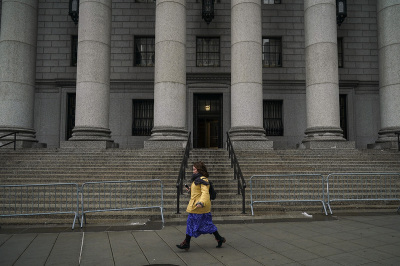
Federal judge Indria Talwani on Monday handed down her final preliminary injunction, forcing the Trump administration to continue sending Medicaid dollars to Planned Parenthood.
With breathtaking brashness, Talwani boldly asserted Planned Parenthood is “likely to succeed in showing that Section 71113 constitutes a Bill of Attainder and denies Planned Parenthood Federation and its Members equal protection of the law.”
To put it simply, Talwani’s legal reasoning is a mess.
Talwani accepted Planned Parenthood’s argument in the case that Section 71113 of the One Big Beautiful Bill Act (OBBBA), signed into law by President Donald Trump on July 4, violates the abortion giant’s First Amendment right of association and is likely an unconstitutional “bill of attainder,” a legislative provision criminalizing a person or group without due process.
Section 71113 prohibits Medicaid dollars from going to any “prohibited entity” that “is primarily engaged in family planning services, reproductive health, and related medical care,” “provides for abortions” and exceeded $800,000 in Medicaid dollars in 2023. The provision applies for a period of one year.
“In ordering relief, the court is not enjoining the federal government from regulating abortion and is not directing the federal government to fund elective abortions or any healthcare service not otherwise eligible for Medicaid coverage,” Talwani wrote in her 58-page opinion.
“Instead, this order grants preliminary relief that prevents Defendants from targeting a specific group of entities — Planned Parenthood Federation Members — for exclusion from reimbursements under the Medicaid program.”
The decision greatly expands her July 21 preliminary injunction, which had prevented the Trump administration from defunding a limited number of Planned Parenthood facilities.
Now, the Trump administration must “take all steps necessary to ensure that Medicaid funding continues to be disbursed in the customary manner and timeframes to Planned Parenthood Association of Utah, Planned Parenthood League of Massachusetts, and all other Members of Planned Parenthood Federation of America, Inc.”
First, the legal theory that Section 71113 of the OBBBA is a “bill of attainder” is as novel as it is flawed. A bill of attainder, prohibited under Article I, Section 9 of the U.S. Constitution, is a piece of legislation that punishes a party perceived of a crime without due process.
But Section 71113 can’t reasonably be read to insinuate that Planned Parenthood is guilty of any “crime.”
Nor can the statute, with Congress using its constitutionally delegated authority to direct the distribution of federal funds, be reasonably conceived as a “punishment” to Planned Parenthood.
Article 1 of the U.S. Constitution explicitly grants Congress the “power of the purse,” meaning Congress can fund — or not fund — whatever it so chooses for whatever reason. If Congress’s decision to defund a specific group is a “punishment,” then Congress would be guilty of violating the Constitution any time it reduced funding for any entity in any budget bill.
Clearly, such a proposition is ludicrous on its face. Planned Parenthood has no constitutional right to anyone’s tax dollars. Period.
Article 1, Section 9 of the Constitution, enumerating Congress’s powers, states, “No Money shall be drawn from the Treasury, but in Consequence of Appropriations made by Law.”
This clear constitutional provision was given no mention in Talwani’s 58-pages of legal sophistry. Instead, the judge decided she could single-handedly order the government to disburse money from the treasury in violation of the law.
James Madison, the architect of our Constitution, wrote in Federalist No. 58 that “[Congress’] power over the purse may, in fact, be regarded as the most complete and effectual weapon with which any constitution can arm the immediate representatives of the people, for obtaining a redress of every grievance, and for carrying into effect every just and salutary measure.”
Congress could, in theory, defund the entire judicial branch, the whole Medicaid program, or the military if it wanted to. So, a single federal judge overruling the explicit will of Congress on a spending decision is nothing short of absurd.
In Federalist No. 78, Alexander Hamilton wrote that the judiciary would be the “least dangerous” to the political rights of the Constitution because “it will be least in a capacity to annoy or injure them.”
“The judiciary … has no influence over either the sword or the purse; no direction either of the strength or of the wealth of the society; and can take no active resolution whatever,” he wrote.
Talwani, however, has seized the legislative power of the purse for herself.
The U.S. Department of Health and Human Services has already appealed the judge’s July 21 order to the U.S. Court of Appeals for the First Circuit and will likely appeal this one too.
The First Circuit, or, if necessary, the U.S. Supreme Court, should immediately reverse Judge Talwani’s preliminary injunction.
Every additional day the Trump administration is forced by an unelected, unaccountable judge to violate the Constitution, and a duly enacted law passed by Congress and signed by the president, is a loss for the American people and the rule of law.
Zachary Mettler is a staff writer and communications liaison for The Daily Citizen at Focus on the Family. In his role, he writes about current political issues, U.S. history, political philosophy, and culture. Mettler has been featured in The Daily Signal, Life News, The Colorado Independent, and The Millennial Review. In his free time, he enjoys reading, running, hiking, backpacking, and walking his dog. Find his writing at: https://dailycitizen.focusonthefamily.com


















